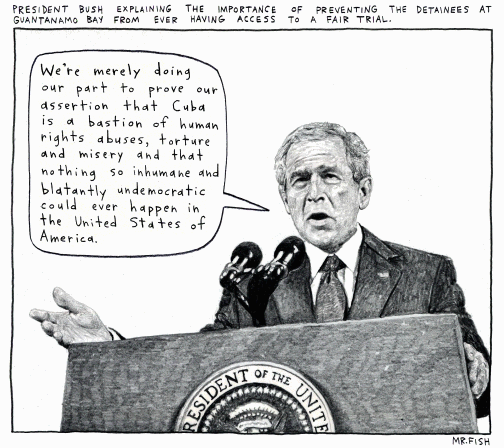Search
Democracy Links
Member's Off-site Blogs
the legacy of a pet goat .....

In the real world outside the U.S. Naval Base at Guantánamo Bay, Cuba, Barack Obama’s pledge to close Guantánamo and scrap the military commissions (the system of trials for “terror suspects” that was established in the wake of the 9/11 attacks) has provoked a rare outburst of frenzied media coverage.
With no concrete plans announced by the President-elect’s transition team, pundits and off-the-record officials of all political hues have stepped in to fill the void with speculation about the significance of the remaining 255 prisoners, some shrill demands for legislation endorsing “preventive detention,” some equally shrill warnings that robust techniques will be needed in the future to deal with captured terrorists, and a range of opinions about whether the Guantánamo prisoners regarded as a genuine threat to the United States (estimates range from several dozen prisoners to around 80) should be transferred to the U.S. mainland to face trials in federal courts or in another brand-new system.
Some of these opinions are genuinely troubling, and reveal the extent to which the government’s fear-filled “war on terror” rhetoric of the last seven years has permeated the U.S. psyche. Proposals to create new legislation authorizing “preventive detention,” for example, actually seek to justify much of what the Bush administration has been doing at Guantánamo, and it beggars belief that citizens in a civilized society founded on the rule of law could attempt to justify imprisoning people not for what they have done, but to prevent what they could conceivably do in future.
The proposal is doubly disturbing because the government’s assertions that some of the prisoners may be dangerous comes not from evidence that can be tested in a court of law, but from intelligence reports that may or may not be reliable, and from hearsay and confessions – made by other prisoners, or by the prisoners themselves – that may have been produced through the use of torture or other forms of coercion, or through bribery (a well-chronicled “rewards” system for prisoners regarded as “cooperative”).
- By John Richardson at 5 Dec 2008 - 11:14pm
- John Richardson's blog
- Login or register to post comments
Recent comments
1 hour 17 min ago
2 hours 41 min ago
2 hours 50 min ago
3 hours 49 min ago
4 hours 57 min ago
5 hours 22 min ago
6 hours 58 min ago
7 hours 6 min ago
9 hours 22 min ago
10 hours 31 min ago